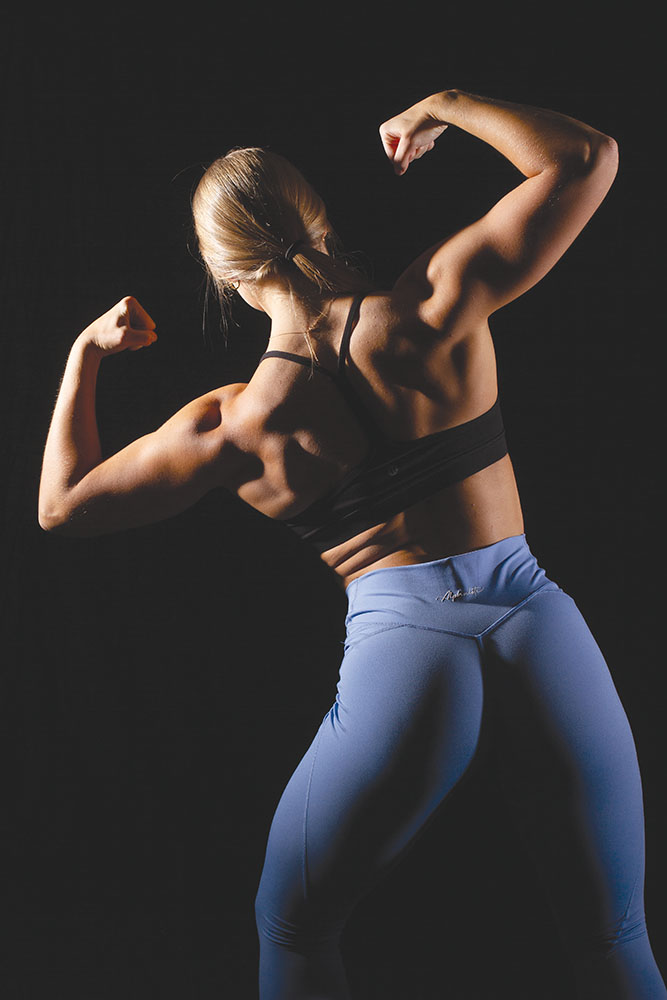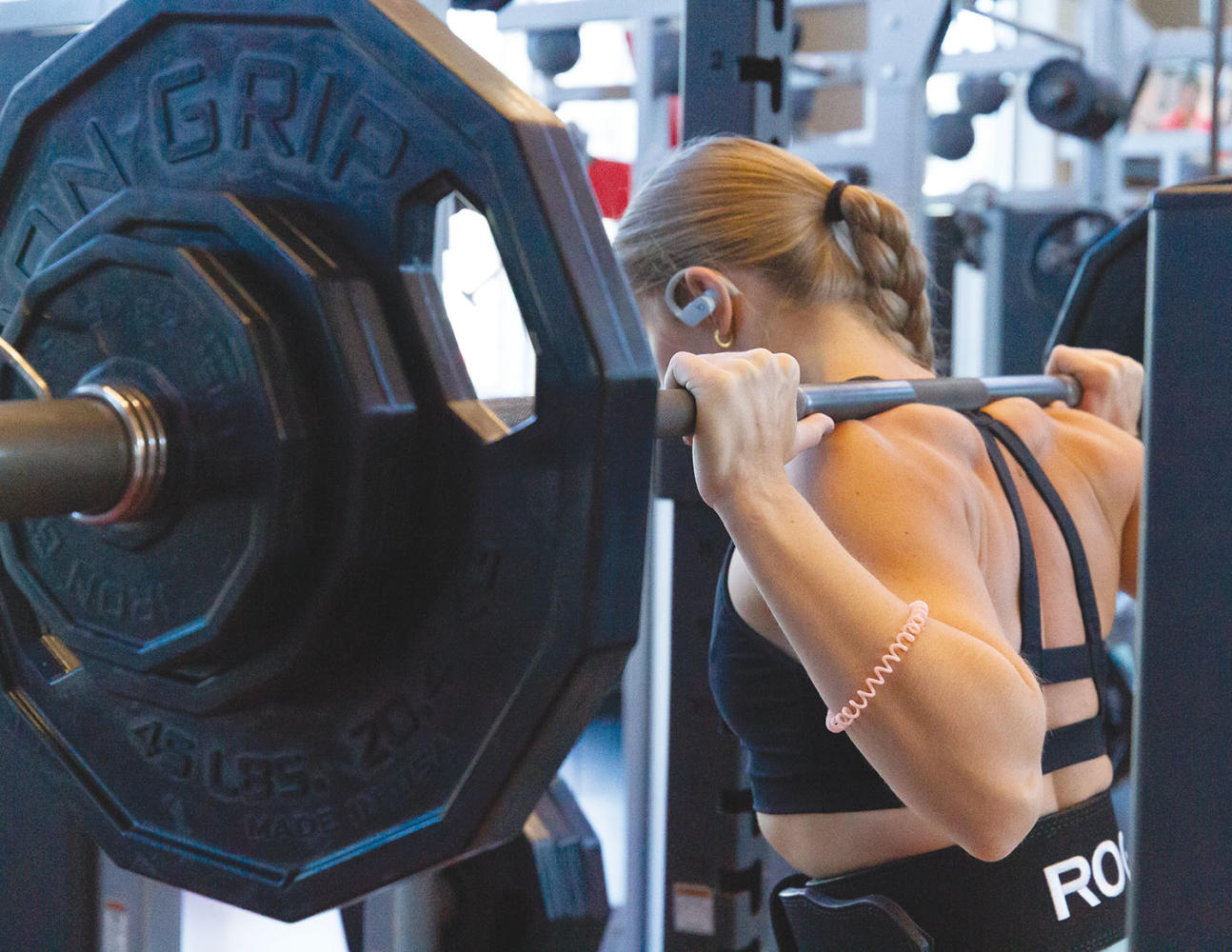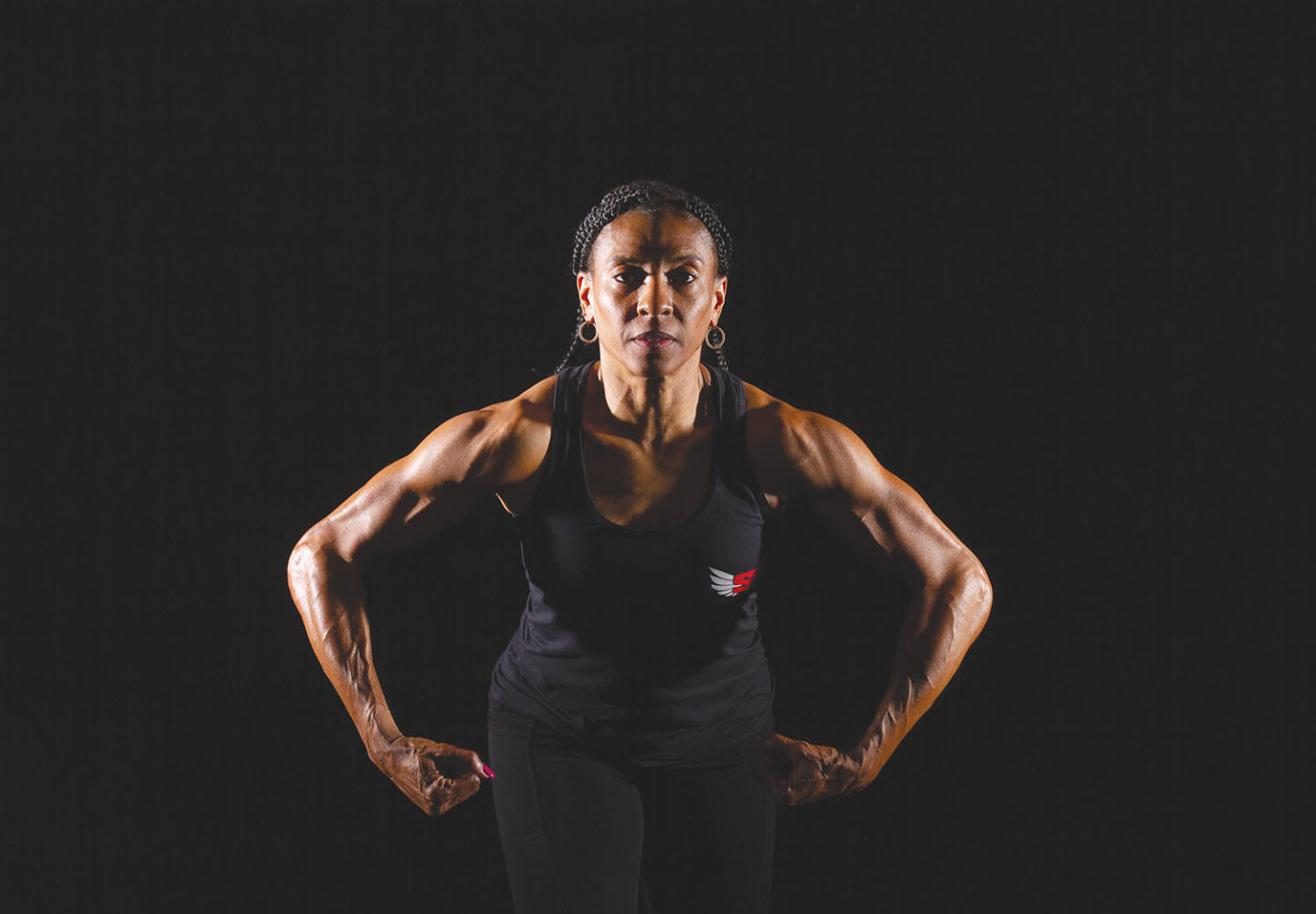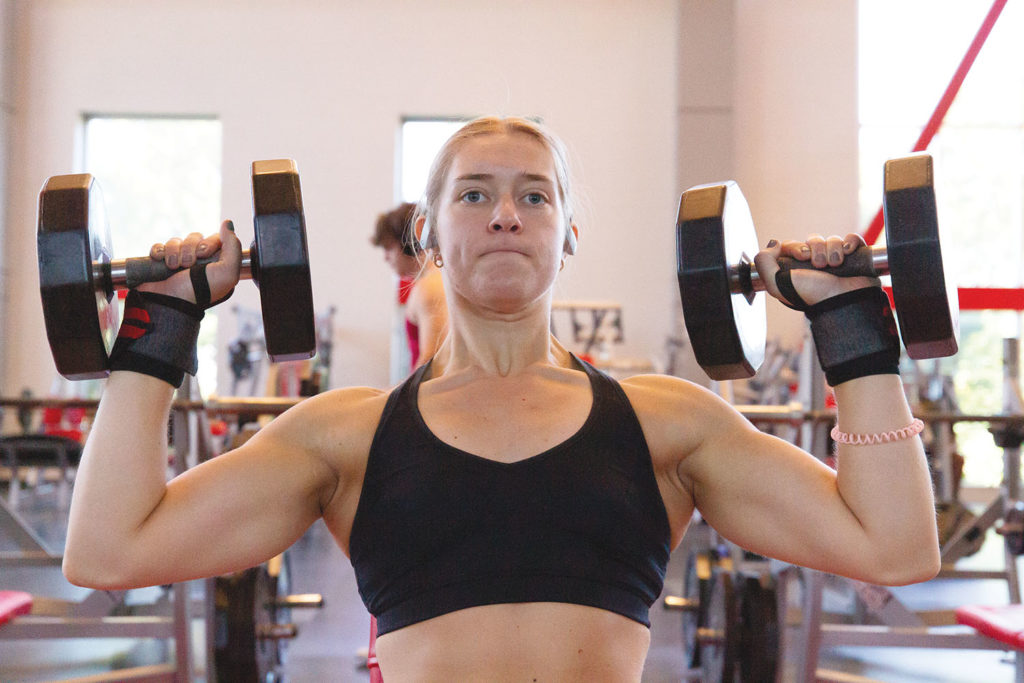Story by Zachary Clifton and Audrey Plescia
Bodybuilders are known for their distinguishable postures and muscled stature. Underneath the layers of muscle and skin lay hours of hard work and dedication.
For many bodybuilders, their dedication to athletics began young.
Jacob Taylor Humes, a May 2022 WKU alumnus and aspiring firefighter from Lexington, said his parents met in a gym. Fitness was a theme of his childhood, even though he said he wasn’t a particularly athletic kid.
“I was always picked on. I was always pretty small, always the younger kid, the smaller kid, the shorter kid, bad grades, stuff like that,” Humes said.
It wasn’t until he built a competitive edge from playing football in eighth grade that he found the desire to get stronger and bigger.
His junior year of college, he walked onto the WKU football team. During Humes’s second year of playing, though, he shattered his arm. Several months of surgery and physical therapy changed his perspective on pursuing football, he said.
“I still love, you know, being competitive and being fit. I love the training aspect of it. I loved working out with the team. I loved all the players,” Humes said. “But I was just like, the last thing I want to do is break a leg or tear an ACL and be back here again.”
Meg Boshaw, a senior from Germantown, Tennessee, had a similar experience with childhood sports. She began competing in gymnastics at 4 years old, but in seventh grade, she fractured her back and consequently lost her love for the sport, so she quit.
The following year, she began playing lacrosse, then running cross country two years later. Following her graduation from high school, however, Boshaw said she felt lost.
“I just really didn’t feel, like, comfortable in my own skin,” Boshaw said. “So, I started going to the gym with my dad.”

Remembering the love she had for pushing herself to her limits during her time as a gymnast, Boshaw said she loved seeing the boundaries and potentials of her body when lifting. She said building her body built her confidence.
Michelle Jones, an associate professor of mathematics at WKU, started running at age 7. Running, she said, allowed her to see a world outside of her poverty-stricken childhood in Baltimore.
“We were very, very poor — grew up on food stamps, welfare — and a lot of people that I went to school with did not make it out of Baltimore. And so my goal was to get out of Baltimore and get as far away as I could,” Jones said. “Running allowed me to do that.”
Jones said her life changed when she received a scholarship to run track at Howard University, a historically Black college in Washington D.C. There, she said, a coach took her under his wing.
“He just helped me figure out life and, you know, this girl, this little girl from the hood who didn’t know how to do anything as a first-generation college student,” Jones said. “I didn’t know that I needed linens for the beds. I didn’t know I needed pillows.”
At Howard University, Jones was a six-time All-American track star where she — twice — qualified to run in the Olympic trials. In the trials for the 1992 games in Barcelona, Jones was mere seconds away from becoming a member of Team USA.
Jones said she continually had to prove herself through her undergraduate career. She said she failed her first college math course because a professor wouldn’t work with her athletic schedule but that her coach taught her the importance of pushing through.
“He said, ‘In life, you’re gonna have to deal with difficult people; you can’t always just run away,’” Jones said. “You have to hang in there and handle it and make lemonade out of them.”
Jones said her coach was the father figure she never had, and they remained close until the day he died. To this day, Jones said when she begins to doubt herself, she hears his voice in her head saying ‘Get your butt back out there.’
“He always talked about not making excuses, just getting it done,” Jones said.
Jones said she believes her college coach would be proud of her journey and success with bodybuilding, which she got into during the pandemic.
“I just woke up one day and said, ‘I think I want to be a bodybuilder,’” Jones said.
Humes, the bodybuilder from Lexington, emphasized the importance of support when starting a bodybuilding journey.
He said he was inspired to pursue bodybuilding by a conversation with his parents. He said his relationships with them and his sister have been hugely influential. Without them, he never would have dove into the discipline of bodybuilding.
“It’s always easier to go for something that might scare you a little bit when people that you care about have your back,” Humes said.
Humes said his athletic transformation was personal.
When he was younger, he said there were days when his father would have to come eat lunch with him in the cafeteria because he was getting picked on.
“I just looked up to other kids in my school that, you know, were a little bit taller than me, a little faster, a little more muscular, got more attention, were more athletic,” Humes said.
He said he remembers what it was like to be the scared kid in the gym, watching the intimidating guy benching 215 pounds or squatting 500 pounds in awe. Though he has built his body into a machine, Humes said he still struggles with insecurity. He said sometimes he still feels like “that skinny kid getting picked on.”
“Everyone has to come from square one. Everyone has to hit that first rep,” Humes said.
As a woman taking the first steps into her lifting journey, Boshaw said she felt uncomfortable.
“It was nerve-wracking to go by myself into the lifting section with all the guys and stuff,” Boshaw said. “But now I dominate.”

She said the most important parts of bodybuilding are taking the first step and building consistency.
“If you are constantly in a routine, it’s not hard,” Boshaw said. “If you don’t step out of your comfort zone, you’re never gonna grow.”
She said she did not lift for bodybuilding until 2021, when she saw bodybuilder influencers on Instagram. In the spring, she found a coach.
Boshaw said she is currently preparing for her first bodybuilding competition.
Jones said her journey started in February 2021, with her first competition on June 21 in Chattanooga, Tennessee. There, she qualified for a national show.
Jones said her first experience at the national show was rocky. After rushing on stage because of a makeup mishap, she placed much lower than she would have liked. Jones said the judges at the national competition told her in feedback that she needed to build her glutes.
“That’s what my coach and I focused on for improvement season, so I came home, and I ate all the things that I couldn’t eat while I was in prep,” Jones said. “And then after Thanksgiving, I went back into the 2022 season.”
Jones said she pushes herself to improve her body from each competition with a “me versus me” mindset.
A large part of her motivation comes from her life experience as a Black woman.
“As a Black woman, I feel like I’ve gone through a whole lot of things that have only made me stronger,” Jones said. “It makes me have the mindset that I can do anything.”
Reflecting on her time as a Black female novice in her first competitions, Jones said she felt pressure to perform wearing a wig, rather than her natural hair.
She said she feared being discounted for not fitting into societal standards for beautiful hair.
Following the wisdom of a fellow Black female professional bodybuilder, though, Jones plans to wear her hair in different styles in the future.
“She said her hair is her strength, and she would not put on a wig to satisfy any judges,” Jones said.
Jones said that she rarely sees Black women with natural hair win competitions, but that change was contingent on the mindsets of the judges.
“We just need more judges that are open-minded. We need more underrepresented minorities as judges,” Jones said.
Jones called for more representation on the stage as well.
“I would like to see more natural, African American women on those platforms at the top of these competitions,” Jones said.

Jones noted that bodybuilding takes more than physical commitment, but an emotional and mental commitment to discipline. Jones said she personally loves sweets, especially sweet tea, but her vision for the future of her body comes first.
Her involvement in the sport and investment in her body has also helped her more easily dismiss other people’s criticisms, Jones said. She said it has built her confidence in the power of determination and taught her about the resilience of the human form.
Jones has since competed in Texas, Kentucky and Pennsylvania. In Pennsylvania, Jones competed at her second national show. This time, she won.
Jones said placing first in a national show got her a “pro card,” earning her the right to reference herself as a professional bodybuilder even though she has only competed in five shows.
Jones said she will make her professional debut in 2023 since she is done competing in shows for the 2022 season.
Humes competed in his first bodybuilding show in April 2021.
As a 22 year old, Humes said he has made many social sacrifices to follow the discipline of the sport.
“What do a lot of 22 year olds want to do on the weekends? They want to go to the bars; they want to hang out; they want to get food,” Humes said. “And dating is a pain in the ass.”
Boshaw said she has seen a similar sacrifice in her social life. She said she could not celebrate her 22nd birthday in August because of the intensity of her training.
In contrast, Humes said his professional and academic lives have greatly benefited from his dedication to bodybuilding. He said the discipline needed to get up at 6 a.m. to do cardio before class is the same discipline needed to continually pursue personal, academic and professional goals.
“Motivation is temporary. Discipline is a mindset,” Humes said.
Boshaw said the most fulfilling aspect of bodybuilding is her discipline.
“If you want to get any better, you’ve got to do your stuff, and you’ve got to stay consistent with it. So, I can’t really think about anything else,” Boshaw said.

Boshaw said the most difficult part of her journey has been moving through the building and cutting phases of her training program. During building phases, bodybuilders gain a significant amount of weight in order to bulk up, Boshaw said. During cutting phases, Boshaw said she limits her calorie intake, which drags her energy throughout the day.
“I’ve come to realize that like, in order to grow, you have to be comfortable with being uncomfortable,” Boshaw said.
However, she emphasized the importance of food, even during cutting seasons.
“A lot of females think that ‘Oh, in order to get tiny and small, I need to not eat anything,’” Boshaw said. “But in reality, that’s the complete opposite of what you want to do. Food is fuel.”
Boshaw said without food, no one can expect to perform.
Jones said she leaned on the knowledge of professional competitors from her team, Instagram and Google for “recipes for meals that don’t taste like cardboard” after getting into bodybuilding without prior knowledge.
Now that she has built a name for herself in the sport, she said she hopes to guide other women through their journey. Jones said she believes women in bodybuilding have to stick together because of their mutual place “on the bottom of the totem pole.”
“I love it when women uplift one another,” Jones said.
Humes said he would like to see less drug-enhancement in the future of bodybuilding. He said drugs are currently built into the sport’s culture.
Humes said that he personally has never touched performance enhancement drugs. The lifestyle he has built is a natural one.
“I’ve never touched anything. I’ve used food, natural supplements and hard work to get to where I am now,” he said.
Humes said he is heartened by the bodies he has seen on the stage recently. He said they are naturally achievable and desirable without being monstrous.
“I think we’re getting a much stronger emphasis on health over everything,” he said.
Though Humes said that there are some self-conceited bodybuilders, the majority of the people he has met through the sport have been incredibly kind and openly share their stories backstage.
“Maybe they come from a drug-ridden past; maybe they were in jail; maybe they were overweight; maybe they were anorexic; maybe they are just getting out of a horrible marriage,” he said. “This is something that they want to do to push themselves to give them a new challenge.”
Boshaw said bodybuilding is a discipline.
Rather than something to be romanticized, she said bodybuilding should be seen for what it is: incredibly difficult.
“It’s not as glamorous as a lot of people make it out to be,” Boshaw said.



